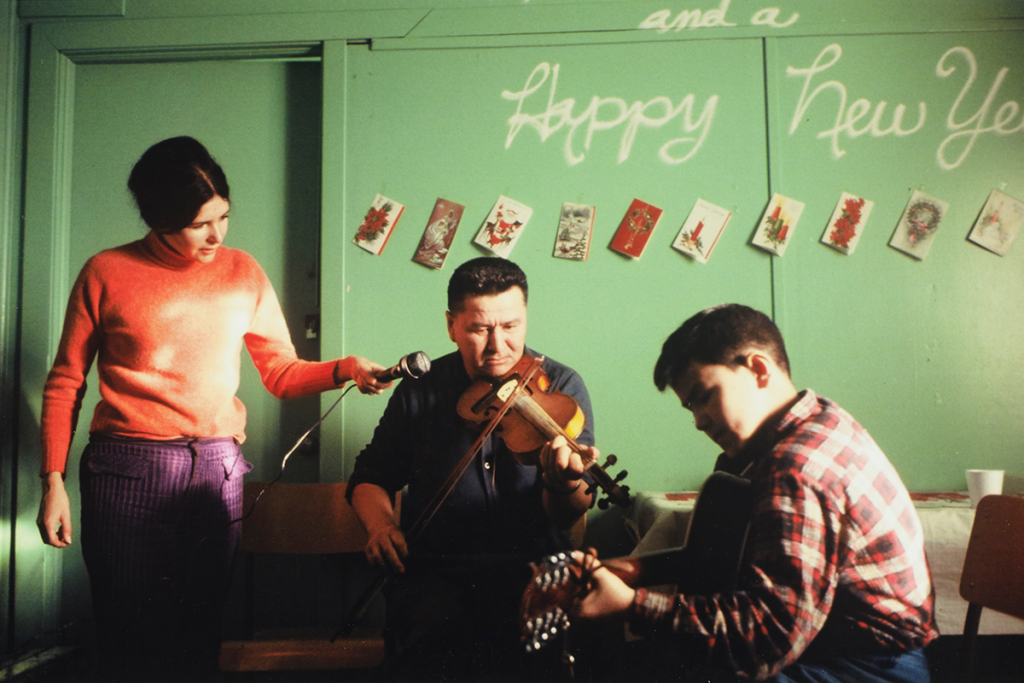With, about, and through the work of Alanis Obomsawin: Music, Fashion, Film, and Education
A program of:
The Children Have to Hear Another Story
Saturday, November 25, 2023
1pm–3pm
Online on Zoom
With panelists Caroline Monnet, Archer Pechawis, Skawennati, and Amy Zion
An interdisciplinary tribute to Alanis Obomsawin’s work, this conversation considers music, documentary and fiction films, activism, fashion, and education through the lens of the panelists’ own practices and on the matter of the present and future thinking in their work. The conversation will be moderated by Jason Ryle (Indigenous Programmer, Toronto International Film Festival) and includes scholars, artists, and thinkers working across multiple media such as film, fashion, sculpture, and new media.
The topics of conversation consider the broader context in which artists engage with teaching and activist pedagogy, including working with children. The panelists reflect on what is at stake when artists engage with alternative approaches to learning and what can make this work both vital and necessary to the idea of ‘education.’ The artists will discuss their past and/or current research, as well as their engagement with contemporary culture from the point of view of Indigenous ancestral practices, histories, memory, and social change.
The event is free, and all are welcome. Registration is required.
—
About the Moderator
Jason Ryle is the International Programmer, Indigenous Cinema at the Toronto International Film Festival. He is Anishinaabe from Lake St. Martin, Manitoba, and has spent his career working within the Indigenous media arts community as a producer, curator, story editor, independent arts consultant, and advisor. From July 2010 to June 2020, he was the Executive Director of imagineNATIVE, an Indigenous-run organization mandated to support Indigenous filmmakers and media artists. In 2021, Jason received the Clyde Gilmour Award from the Toronto Film Critics Association.
—
About the Panelists
Born to an Anishinaabe mother and a French father, Caroline Monnet is from Outaouais, Québec, and now based in Montréal. After studying at the University of Ottawa and the University of Granada, in Spain, she pursued a career in visual arts and film. Her work is regularly presented internationally and can be found in prestigious museums, private, and corporate collections. Monnet has become known for minimalist yet emotionally charged work that uses industrial materials and combines the vocabulary of popular and traditional visual cultures with the tropes of modernist abstraction to create unique hybrid forms. She is represented by Blouin-Division Gallery.
Born in Alert Bay, BC, Archer Pechawis has worked as an artist since 1984 with particular interest in the intersection of Plains Cree culture and digital technology, merging “traditional” objects such as hand drums with digital video and audio sampling. He has exhibited his work across Canada and internationally and received a Best New Media Award (2007) and Best Experimental Short (2009) at the imagineNATIVE Film + Media Arts Festival. Archer has worked extensively with Native youth, originally teaching juggling and theatre, and now digital media and performance. He is Assistant Professor of Indigenous Performance at York University and a member of Mistawasis Nêhiyawak, Saskatchewan.
Skawennati is a visual artist. Her machinimas and machinmagraphs (movies and still images made in virtual environments), textiles, and sculpture have been presented internationally and collected by the National Gallery of Canada, the Musée d’art contemporain de Montreal, and the Thoma Foundation, among others. Recipient of a 2022 Hewlett 50 Arts Commissions Grant and an Honorary Doctorate from the Minneapolis College of Art and Design, she is also a founding board member of daphne, Montreal’s first Indigenous artist-run centre. She co-directs Aboriginal Territories in Cyberspace (AbTeC), a research-creation network at Concordia University. Originally from Kahnawà:ke, Skawennati resides in Montreal.
Amy Zion is a curator and writer living in Paris. In 2022, she curated Evidence, a group exhibition at Mercer Union, Toronto, which featured Obomsawin’s film, Christmas at Moose Factory (1971).
—
Our Supporters
We gratefully acknowledge the operating support from the Canada Council for the Arts, the Ontario Arts Council, and the Toronto Arts Council. Special support for this event has been provided by ISO (Indigenous Screen Office).
Image: Alanis Obomsawin, Christmas at Moose Factory, c. 1971 (production photograph). Courtesy of the National Film Board of Canada and the artist.

